Multivitamins have become a mainstream health product, with the global market valued at $60 billion last year and expected to surpass $115 billion by 2034.
These supplements typically combine vital nutrients such as folate, iron, calcium, potassium, zinc, magnesium, and vitamins A, B, C, D, E, and K, leading the industry in sales.
Multivitamins help fill nutritional gaps, particularly for individuals with dietary restrictions or medical conditions affecting nutrient absorption. Even in developed countries like the U.S., nearly one-third of people are deficient in at least one vitamin or mineral.
Women especially benefit from multivitamins due to unique nutrient needs influenced by menstruation, pregnancy, lactation, menopause, and higher risks for certain health conditions.
Key nutrients for women include:
Iron: Crucial for women of reproductive age to compensate for menstrual blood loss, supporting red blood cell production and oxygen transport. The recommended intake is 18 mg daily, achievable through diet or supplements.
Folic Acid (Vitamin B9): Essential for women who are pregnant or may become pregnant to prevent neural tube defects. The CDC recommends 400 micrograms daily, commonly included in multivitamins.
Omega-3 Fatty Acids: Help reduce symptoms of PMS and menopause and support hormone production. Sources include fatty fish, walnuts, flaxseeds, and supplements.
Calcium: Supports bone health, muscle function, and nerve transmission, especially important post-menopause due to increased osteoporosis risk. Women need 1,000 to 1,200 mg daily from dairy, almonds, sardines, and leafy greens.
Vitamin D: Regulates calcium absorption and supports immune function and mood. Deficiency risk is higher with limited sun exposure; found in fatty fish, egg yolks, and fortified foods.
Magnesium: May alleviate PMS symptoms and improve sleep quality. Found in nuts, seeds, whole grains, and dark chocolate.
Vitamin B12: Supports nervous system health and stress response, particularly important for vegetarians, pregnant women, and older adults.
While nutrients are best obtained from food for better bioavailability, supplements are advisable in certain cases such as heavy menstrual bleeding, vegetarian diets, pregnancy, or limited sun exposure. However, supplements should be used cautiously due to potential interactions and side effects. Consulting a healthcare provider before starting any supplement regimen is recommended to tailor intake to individual needs and avoid exceeding safe limits.
For women over 50, specialized multivitamins are available that focus on bone health, energy, and menopause support. Options include Centrum Silver Women 50+, New Chapter One Daily Every Woman’s Multivitamin 55+, and Nature Made Multi 50+ For Her, among others, each tailored to address specific nutritional requirements in later life stages.
In summary, multivitamins can be a valuable tool for women to maintain optimal health across different life phases, but personalized advice and a balanced diet remain fundamental.


